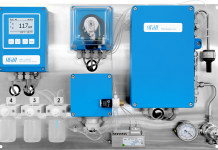Work in a chemistry laboratory has allowed University of Bath spin-out biotechnology company Atlas Genetics to win approval from the EU to sell a device that detects the sexually transmitted disease chlamydia.
The Atlas io® system allows infectious diseases to be detected and identified in less than 30 minutes, meaning patients can be tested and treated within a single brief visit to the clinic. The World Health Organization estimates that 499 million new sexually transmitted infections (STIs) occur each year. The technology for the test is based on chemistry research led by Professor Chris Frost and Dr Toby Jenkins in the University’s Department of Chemistry.
Professor Frost, Head of the University’s Department of Chemistry, said: “To prevent the spread of infectious diseases, especially sexually transmitted infections, it’s very important to get a fast, easy diagnosis that can be given at the first appointment with a patient, allowing treatment to begin quickly before the patient leaves.” The system uses DNA probes with bespoke electrochemical tags attached to accurately detect for infectious diseases. This system has significant benefits over existing diagnostic tests, allowing for faster results. Atlas Genetics was created in 2005 and has attracted more than £35 million in investment.
John Clarkson, CEO of Atlas Genetics, said: “STIs are on the rise and the faster a diagnosis can be made, the faster treatment can be given, not only benefiting the patient but also saving time and money. We believe that our io® platform will play a key role in the future of STI diagnosis.”











